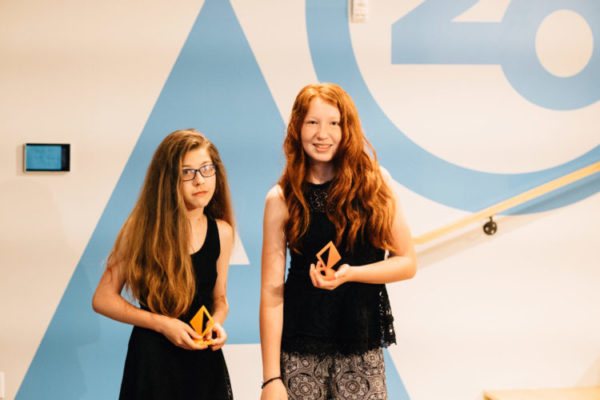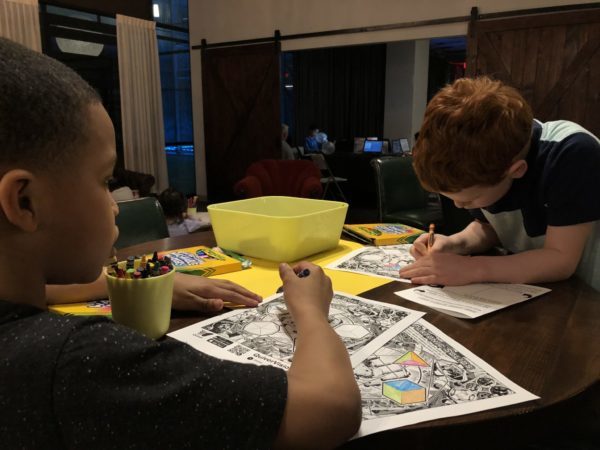
‘Kindness & Empathy’ drive winning game designs at G4C Student Challenge
Above image: Kathryn Bodnar and Kendall Coddington swept the Kindness & Empathy category at the G4C Student Challenge. Photo by Ben Filio.
For 13-year-old Kendall Coddington, technology is a powerful tool.
In the wrong hands, “technology is used for bad purposes, such as cyber-bullying,” says Kendall, a student at Highland Middle School. “I want people to use it to promote positive messages and make the world a better place.”
That’s what Kendall did this spring, when she entered the Games for Change (G4C) Student Challenge in the “Kindness & Empathy” category. She won first prize—and a $1,000 scholarship from Take-Two Interactive—in the digital game design competition.
Her “Garret at Chameleon School” game follows Garret, a gecko who navigates the challenges of being the only non-chameleon critter at his school. First, he tries to fit in. Later, he embraces the qualities that make him unique.
Kendall developed the game at an interactive workshop held during the 50th-anniversary celebration of “Mister Rogers’ Neighborhood” at the Heinz History Center. Surrounded by images of Fred Rogers, an enduring symbol of kindness, kids were provided with inspiring quotes from Rogers, as well as facts about the science of empathy from iThrive Games and the impact of kindness on mental health from Lady Gaga’s Born This Way Foundation.

Other “game jams” took place during Pittsburgh’s Inclusive Innovation Week through partnerships with subject area experts. For instance, the “News Literacy” jam empowered students to spot “fake news” through lessons from Common Sense Media, and the “Wildlife Conservation: Pollinators” session gave kids access to resources from the Pittsburgh Parks Conservancy as a basis for their games.
The goal of the Student Challenge—hosted for the second time in Pittsburgh with support from the Grable Foundation—is to ignite a passion for STEM in middle and high school students, while engaging them (and their teachers) in real civic issues through video games. Individual competitions are coordinated in cities across the U.S., but they all provide game-based learning resources for educators, student workshops and mentorship from professional game designers.
“Every year we strive to create fun, engaging, transformational learning experiences with our local Student Challenge,” says G4C President Susanna Pollack. “It’s also incredibly important to us that we instill in kids a sense to really engage with those around them, their communities and ultimately, the world.”
Kathryn Bodnar, 13, also was recognized by G4C for her entry, “Chasing Dreams,” in which players become Sky, a girl who discovers her world is being disturbed by flames from a mysterious source. Love and acceptance keep the flames at bay.
“The great thing about game-making is that anyone can enjoy playing games. Therefore, anyone can make them,” says Kathryn, a student at the Pittsburgh Gifted Center. “It feels so fulfilling to make your own, and especially to win.”
It’s especially meaningful to Kathryn, who overcame her personal struggles with communication and deadlines to reach her goal.
“I am proud of Kathryn for putting herself out there even though it was difficult for her,” says Susan McCoy, Bodnar’s game design teacher. “This competition was a vehicle which helped her gain confidence in herself and her abilities.”
McCoy is pleased to see the competition make STEM accessible to girls, who are often underrepresented in coding and gaming.
“I thought it was wonderful that the two winners this year were young women,” she says. “It proves we must be doing something right that these two young people are not afraid to assert themselves and give their best.”
Kendall says the competition sharpened her coding skills and underscored the importance of perseverance. But she believes the most important lesson is that games can be a catalyst for positive social change.
“If my game causes young people to be more kind to each other,” she says, “then it is a success.”
Kids can catch a workshop at 2:30 p.m. July 10 at Carnegie Library’s Squirrel Hill branch.